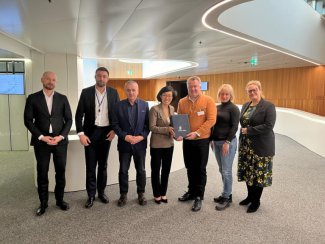Contact center of the Ukrainian Judiciary 044 207-35-46

In the context of international collaboration, the World Intellectual Property Organization (WIPO) and the Supreme Court signed a Memorandum of Understanding on intellectual property procedures to realise the benefits of the intellectual property system while complying with relevant international standards and widely accepted principles.
The purpose of this Memorandum is to develop cooperation and joint activities between the WIPO and the Supreme Court to strengthen the judicial system and the protection of intellectual property, in particular:
The document also provides for cooperation in the development and implementation of a programme of continuing education of judges on intellectual property issues for the judiciary of Ukraine, namely:
Continuing the theme of cooperation between WIPO and the Supreme Court, Min Eun Joo, Director of the WIPO Judicial Institute, met with Judges Ihor Benedysiuk and Iryna Bulhakova of the Judicial Chamber on Cases on the Protection of Intellectual Property Rights and Cases Related to Anti-Monopoly and Competition Legislation of the Commercial Cassation Court of the Supreme Court.
According to Ihor Benedysiuk, secretary of the specialised chamber of the Supreme Court's Commercial Cassation Court, given the changes in legislation and its application, the emergence of new categories of disputes and approaches in the field of intellectual property, the courts are extremely interested in improving the skills of both newly appointed judges and judges who already specialise in considering the relevant category of disputes. The Supreme Court is therefore planning to intensify the training of judges specialising in IP disputes, with the involvement of international experts.
As a result of the meeting, the parties discussed further steps of cooperation in the field of intellectual property proceedings and joint events: forums, seminars and training for judges dealing with intellectual property cases.